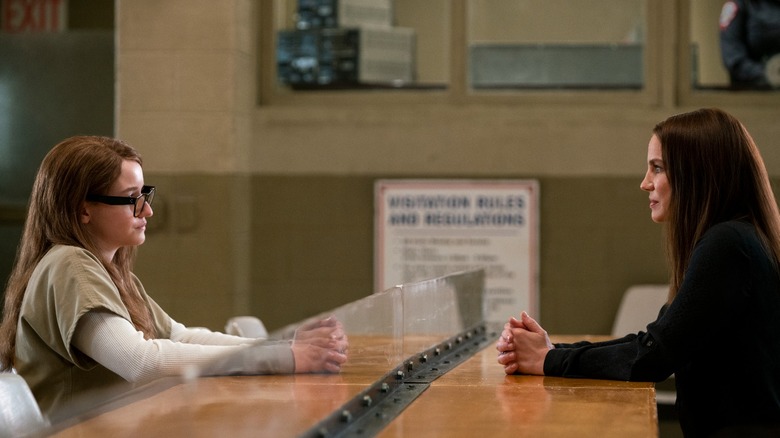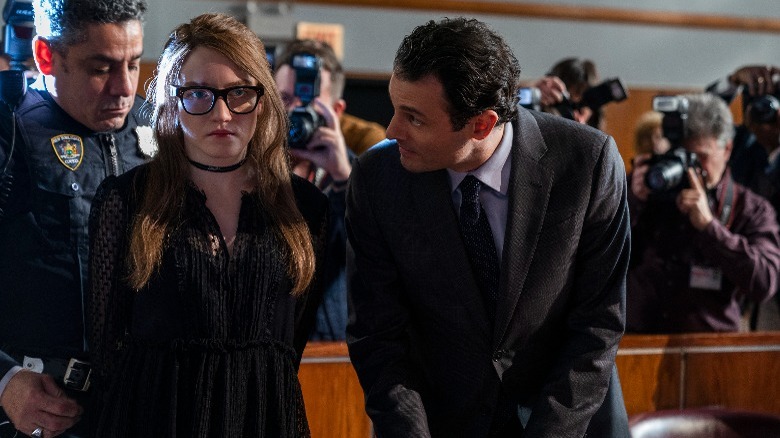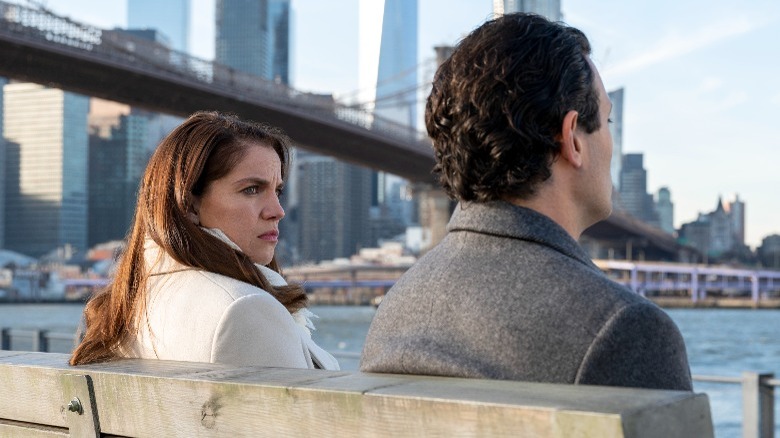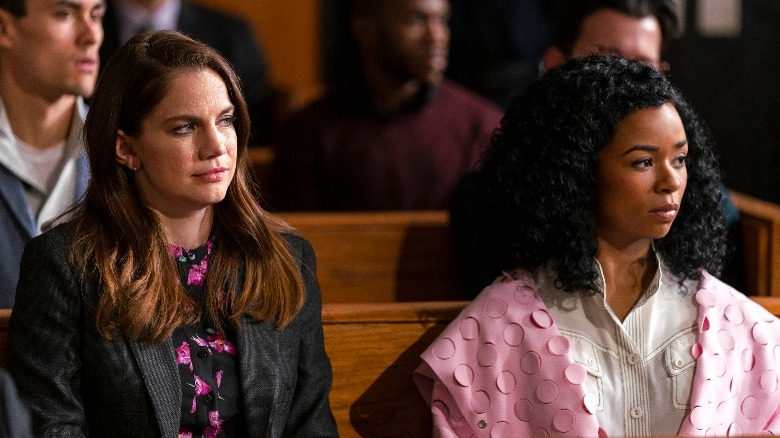
Netflix's limited series "Inventing Anna" seems like a recipe for excitement and melodrama. Take one true story about a woman who makes a name for herself among the New York upper crust by faking an entire life. Add in a reporter who may or may not be influenced by her compelling, if obviously false, story. Pepper in a talented cast including "Ozark" star Julia Garner, Anna Chlumsky, Laverne Cox, and more. Shake, stir, and serve on ice.
After ten episodes, it's unclear exactly how well this recipe actually works. "Inventing Anna" plumbed the depths of Anna Delvey's (A.K.A. Anna Sorokin's) wild story, digging up some of the juiciest details about the events that landed her in state prison. Yet it also ended on an unexpected note, with two of the main characters on Anna's side despite all evidence indicating she's a ruthless manipulator. Did "Inventing Anna" lay enough sympathetic groundwork to earn its ending? Let's investigate.
Guilty In Court, Innocent In Her Head

The series ends with Anna being found guilty on multiple charges. She's sentenced to four to twelve years in prison for grand larceny in the second degree, attempted grand larceny, and theft of services. These charges stemmed from Anna's attempts to secure massive loans from banks, as well as her apparently prolific history of dodging bills for high-end hotels and restaurants. She was found not guilty on some charges, including the one related to the credit card debt she racked up on her friend Rachel's (Katie Lowes) company card.
After the trial, Anna, who has until now deflected all the accusations lobbied against her, basically confesses. "I didn't need to f*** over my friends for 60 grand when those f***ing frat boys at Fortress were willing to hand over 20 million!" she tells her lawyer, Todd (Arian Moayed). She doesn't seem remorseful about her actions, only about the fact that Todd pivoted at the last moment and used his closing arguments to argue she wasn't business savvy enough to be considered a threat. Anna, who wanted to be seen as a girlboss even from prison, felt betrayed and undermined by his defense strategy.
Later on, journalist Vivian (Chlumsky) meets with Anna ahead of her transfer to state prison. Vivian seems to expect some sort of camaraderie or respect from the woman, which is weird since she's never gotten that before. Instead, Anna disses Vivian's shoes and tells her she was only good for making her famous. "My only mistake was to overestimate people's ability to handle stress," she says, failing to admit culpability once again. Still, she's obviously lonely and holds Vivian's hand before the pair are separated.
At the very end of the show, we learn that the real Anna Sorokin was released from prison in 2021, but taken into custody by ICE soon after due to an expired visa. We've heard mention of that visa before, when Vivian accuses Anna of faking a suicide attempt to stop the clock on its expiration. The last we see of Anna, she's on a bus in her prison garb, her face unreadable. Given what her own mother said about growing up feeling like Anna was a stranger, it seems we're no closer to knowing the real Anna than we were at the beginning of the series.
An Unusual Influence

The series seems to think some people "get" Anna, or are at least so deeply trapped in her web that they think they do. Aside from reporter Vivian, Todd also ends up derailing his life to stand by Anna. He skips out on a vacation with his family to comfort her, despite knowing his wife (Caitlin FitzGerald) might divorce him if he prioritizes his career over his family one more time. "She's got you parking her car, Todd!" she declares when he breaks the news that he's skipping the trip.
She's totally right. This series makes some odd choices, but having Todd and Vivian go full Team Anna without ever endearing her to us in any substantial way might be the weirdest. Go on vacation, dude! Instead, he meets up with Vivian, who is equally hung up on the whole situation. After the trial ended, Vivian — who had previously been in hot water for a journalistic scandal — was offered the chance to return to a position of glory at her job. She could have a nice office and cover the Anna Sorokin beat for as long as America paid attention. Instead, she walks out of the Manhattan Magazine office, struck by the fact that she crossed a line by lending Anna the white dress she wore to the last day of trial.
That realization doesn't seem to bring about any sense of moral questioning, though. Vivian's new baby and husband are nowhere to be found in these final scenes, as Anna seems to be her full and unapologetic focus. She sits on a bench with Todd, and the two have it out with each other about the ways they've influenced the case. He accuses her of using Anna for clicks, which ultimately could have led to her being made an example of by the judicial system. She accuses him of using Anna for fame, improving his roster of clients after a high level of public exposure. Again, we're meant to think this matters since neither seems to care about anything except what convicted fraudster and certified mean girl Anna thinks of them. I'm not sure their conclusions are sound, but at least they have each other.
Who Invented Anna?

Luckily, a few people did escape Anna's gravitational pull by series' end. Neff (Alexis Floyd), the hotel worker who remained loyal to the con artist the longest, decides to leave her job and move to Los Angeles to become a filmmaker. "I am done living life through the lives of others!" she declares to Anna's former trainer Kacy (Laverne Cox). "I'm a director!"
The show's last moments give us an update on the people who inspired each character, in the form of Instagram captions that show side-by-side pictures of the actors and their real-life counterparts. Kacy is still a trainer and life coach, but has cut out any clients who cause too much drama. Todd became a go-to defender for fraudsters, but also started spending more time with his family after a health scare. Neff really did move to LA, and Rachel, the one-time Vanity Fair writer who Anna allegedly stole from, wrote the popular book "My Friend Anna."
The show's last intertitle is both perplexing and interesting. "This entire series is inspired by the reporting of Jessica Pressler," the screen says, before the credits roll. At first, it seems like a regular enough way to give credit to a source. Pressler, we learn, went on to be a Vanity Fair correspondent and wrote a book. But why not put the credit to the writer who inspired the character of Vivian somewhere in the end credits? Why make it a part of the actual conclusion?
The answer is simple: it's a clever way to make us think, once more, about who exactly is inventing Anna. The version of her we see on screen is a portrait inspired by a news article inspired by a reality that the scammer clearly twisted more often than not. What we're watching is three degrees removed from the pure, whole truth, if not more. We may be left feeling unsatisfied, frustrated that no one can seem to get to the heart of this enigmatic and contradictory figure. As we leave the show behind and go out in the world to talk about it, we'll become culpable too, inventing Anna right along with everyone else.
Read this next: The Best Movies Of 2021
The post Inventing Anna Ending Explained: What Happened to Anna Delvey? appeared first on /Film.
0 Comments